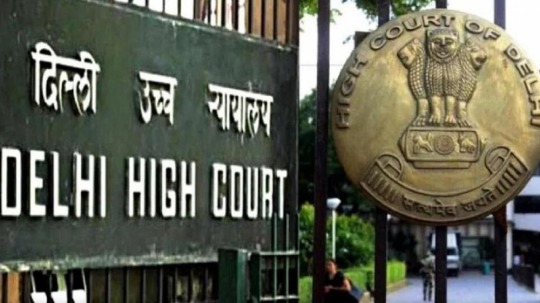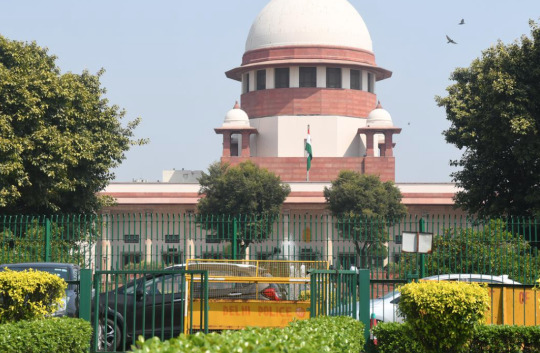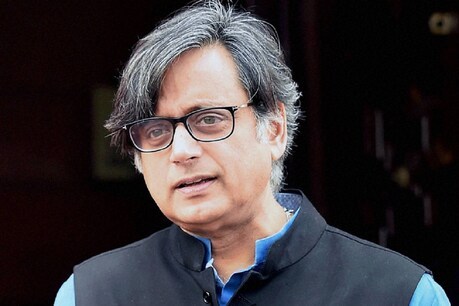#filed against Trinamool Congress leader Mahua Moitra
Text
Cash For Query Case : जय अनंत देहाद्राई ने Delhi HC से वापस ली महुआ मोइत्रा के खिलाफ मानहानि याचिका
New Delhi: वकील जय अनंत देहाद्राई ने तृणमूल कांग्रेस नेता महुआ मोइत्रा के खिलाफ दायर मानहानि याचिका दिल्ली हाई कोर्ट से वापस ले ली है। जस्टिस प्रतीक जालान ने याचिका वापस लेने की अनुमति दे दी।
बीस मार्च को हाई कोर्ट ने कहा था कि अगर देहाद्राई ने सार्वजनिक रूप से आरोप लगाए हैं तो महुआ मोइत्रा को भी अपने ऊपर लगे आरोपों का सार्वजनिक रूप से बचाव करने का अधिकार है। कोई भी निरोधात्मक आदेश जारी करने से…

View On WordPress
#Advocate Jai Anant Dehadrai#Delhi High Court#filed against Trinamool Congress leader Mahua Moitra#withdrawn the defamation petition
0 notes
Text
Citizenship Act CAA Unconstitutional? 237 Petitions Before Top Court Today
Amid the row over the Centre's move to implement the Citizenship Amendment Act (CAA) weeks before Lok Sabha election, the Supreme Court will hear today a batch of 237 petitions challenging the law. A bench led by Chief Justice of India DY Chandrachud and comprising Justice JB Pardiwala and Justice Manoj Misra will hear the matter.

Among the petitioners are Indian Union Muslim League (IUML), a political party primarily based in Kerala, and Democratic Youth Federation of India (DYFI), Congress leader Jairam Ramesh, Trinamool leader Mahua Moitra and AIMIM chief Asaduddin Owaisi.
The day after the Centre notified CAA rules, the two organisations approached the Supreme Court, seeking a pause on the implementation of the law. They termed CAA "discriminatory" against the Muslim community.
Back in 2019, when the Citizenship Amendment Bill cleared the Parliament, multiple petitions had been filed against it. But the court had not paused its implementation because the rules had not been notified. On Friday, Senior Advocate Kapil Sibal told the court that there was no question of a pause back then since the rules were not notified. Solicitor General Tushar Mehta then said that the fact that the rules were notified before the elections was irrelevant.
Under this law, non-Muslim migrants from Bangladesh, Pakistan and Afghanistan fleeing religious persecution can seek Indian citizenship. Persons from Hindu, Sikh, Buddhist, Jain, Parsi or Christian communities from Afghanistan, Pakistan and Bangladesh, who entered India on or before December 31, 2014, are eligible to seek citizenship under CAA.
The Opposition has slammed the Narendra Modi government over the timing of the law's implementation - four years after it cleared the Parliament. The move is "evidently designed to polarise the elections, especially in West Bengal and Assam", party leader Jairam Ramesh has said.
Trinamool Congress chief and Bengal Chief Minister Mamata Banerjee has said she doubts the legality of CAA and alleged a conspiracy to "snatch citizenship rights". "BJP leaders say CAA gives you rights. But the moment you apply for citizenship, you become illegal migrants and you will lose your rights. You will lose rights and be taken to detention camps. Please think before you apply," she said.
The Centre has trashed the Opposition's allegations. Stressing that the CAA is not "unconstitutional", Home Minister Amit Shah has accused the Opposition of resorting to the "politics of lies". On the timing of the law's implementation, he said, "BJP made it clear in its 2019 manifesto that it will bring CAA and provide Indian citizenship to refugees (from Pakistan, Bangladesh and Afghanistan). BJP has a clear agenda and under that promise, the Citizenship (Amendment) Bill was passed in both houses of Parliament in 2019. It got delayed due to Covid."
He has also said that minorities of the country "need not be afraid because CAA has no provision to take back the rights of any citizen".
0 notes
Text
Facebook controversy: leaders of both BJP and Congress claim breach of privilege against each other
Facebook controversy: leaders of both BJP and Congress claim breach of privilege against each other
[ad_1]

Shashi Tharoor, chairman of the Parliamentary Standing Committee on Information Technology (IT) Affairs, sought a response from Facebook (file photo) The battle started on Twitter when Trinamool Congress (TMC) MP Mahua Moitra attacked a BJP MP…
View On WordPress
0 notes
Link
The Centre Tuesday told the Supreme Court that Citizenship (Amendment) Act (CAA), 2019 does not violate any fundamental right or affect the legal, democratic and secular rights of any Indian citizens.
The central government, in its 129-page affidavit in response to the pleas challenging the constitutional validity of CAA, termed the legislation legal and asserted that there was no question of it violating constitutional morality which is not an "unruly horse".
Seeking dismissal of the pleas, it said Indian secularism is "not irreligious", rather it takes cognisance of all religions and promotes comity and brotherhood.
The affidavit, filed by B C Joshi, Director in the Ministry of Home Affairs, said the CAA does not confer any arbitrary and unguided powers on the executive as the citizenship to the persecuted minorities of Pakistan, Afghanistan and Bangladesh would be granted in a manner as specified under the law governing grant of citizenship.
"CAA does not impinge upon any existing right that may have existed prior to the enactment of the amendment and further, in no manner whatsoever, seeks to affect the legal, democratic or secular rights of any of the Indian citizens. The existing regime for obtaining citizenship of India by foreigners of any country is untouched by the CAA and remains the same," it said.
The amended law seeks to grant citizenship to non-Muslim migrants belonging to Hindu, Sikh, Buddhist, Christian, Jain and Parsi communities who came to the country from Pakistan, Bangladesh and Afghanistan on or before December 31, 2014.
A bench headed by Chief Justice S A Bobde had on December 18 last year decided to examine the constitutional validity of the CAA but had refused to stay its operation.
It had sought response of the Centre on over 100 pleas, including those filed by the Indian Union Muslim League (IUML) Congress leader Jairam Ramesh, challenging the CAA.
IUML has said that CAA violates the fundamental Right to Equality and intends to grant citizenship to a section of illegal immigrants by making an exclusion on the basis of religion.
Regarding the petitioners' contention that the amendment is unconstitutional as it applies to six minorities in three countries and there are other minorities there, the government said the Parliament is competent to earmark the religious minorities in the three countries and is not be bound by the declaration of minority status to any other community or sect by them.
It said the history depicts that persecuted minorities in the three countries -- Pakistan, Afganistan and Bangladesh -- were left without any rights and the historical injustice is sought to be remedied by the amendment without taking away or whittling down the right of any other person.
On petitioners' reliance on Article 15 (Prohibition of discrimination on grounds of religion, race, caste, sex or place of birth) and 19 (Protection of certain rights regarding freedom of speech) in their challenge to CAA, the Centre said these rights are available only to Indians and not to illegal migrant or foreigners.
It said that Indians cannot claim rights under Article 15 and Article 19 on behalf of illegal migrant or foreigners.
The Centre termed as "erroneous" the petitioners' assertion that exclusion of Ahamadis, Shias, Bahaiis, Hazras, Jews, Atheists or Baloch communities from the first tier of classification is arbitrary and discriminatory.
"Intra-religious persecutions or sectarian persecution or persecution due to non-recognition of particular sects to be within the fold of majority religion in the said countries, cannot be equated with the persecution of religious minorities admittedly following and practising a different and completely distinct religion than the majority religion in particular neighbouring countries," the affidavit said.
It said CAA results in not granting any kind of exemptions to Tibetan Buddhists from China and Tamil Hindus from Sri Lanka and the assertion that the law attempts to classify the persons belonging only to the Muslim community as 'illegal migrants' has no basis. The claim that CAA is against any particular community is erroneous, unfounded and designedly mischievous, it said.
"The recognition of religious persecution in the particular neighbouring states, which have a specific state religion and long history of religious persecution of minorities, is actually a reinstatement of Indian ideals of secularism, equality and fraternity," it added.
It said CAA seeks to protect 'freedom of religion', which is an invaluable human right, of the classified communities who have been persecuted for expressing and practising their respective religions in the neighbouring countries.
It said the petitioners' claim that requirement for registration of citizenship have been delegated to the executive are "erroneous" as the National Register of Citizens (NRC) does not create any embargo on any form of citizenship.
It claimed that the subject matter may not be within the scope of judicial review and may not be justiciable.
Several petitions have been filed challenging CAA, including by RJD leader Manoj Jha, Trinamool Congress MP Mahua Moitra, AIMIM leader Asaduddin Owaisi.
Other petitioners include Muslim body Jamiat Ulama-i-Hind, All Assam Students Union (AASU), Peace Party, CPI, NGOs 'Rihai Manch' and Citizens Against Hate, advocate M L Sharma, and law students have also approached the apex court challenging the Act.
0 notes
Text
After SC refuses stay on implementation of CAA, All eyes set on next hearing
After a lot of hue and cry and widespread protests across the country over the Citizenship Amendment Bill, the Supreme Court on Wednesday, refused to stay implementation of CAA and has scheduled January 22 to hear 59 pleas.
The bench issued notice to the Centre on the batch of pleas seeking stay on the operation of the law as well as on the main petition challenging the constitutional validity of the contentious law.
The amended citizenship bill which excludes migrants of the Muslim community from availing citizenship benefits in India, has continued to dominate headlines since past few days. Past precedents show, when a bill is passed in both the houses of parliament and gets SC’s nod, no State can refuse it’s implementation, no matter how much they oppose it and how many supporters they have backing their decision.
After the CAB got presidential assent, flare-ups in premier educational institutions and north-eastern states resulted in law and order problem in the country. There was news regarding the brutalities of police, provocative speeches by our elected political leaders and student unrest. Delhi’s Jamia University and Aligarh Muslim University were among those who witnessed massive protests. Nevertheless, the agitations will soon pass, no matter how strongly the protesters are protesting, the reality lies with the fact that the CAA has fulfilled all the formalities which are required for any bill to become an Act.
The only one institution that can stop CAA is the Supreme Court. Among those who filed petitons against the controversial act in the Supreme Court are Congress leader Jairam Ramesh, All India Majlis-e-Ittehadul Muslimeen (AIMIM) chief Asaduddin Owaisi, Trinamool Congress MP (TMC) Mahua Moitra, Rashtriya Janata Dal (RJD), Jamiat Ulema-e-Hind, Tripura's erstwhile ruling family scion Pradyot Kishore Deb Barman, Indian Union Muslim League (IUML), All Assam Students Union (AASU) and others.
The Bharatiya Janta Party has made it very clear that nothing can stop it from the implementation of this act. Recently, at a rally Amit Shah said, “Come what may, the Modi Govt will ensure that these refugees get Indian citizenship and live as Indians with honour.” Shah also used an oft-repeated justification for the CAA and maintained that because partition was done on the basis of religion and the minorities who are in Islamic states are suffering, that is why the amended citizenship act plans to give citizenship to minorities from other countries.
Given the current scenario, now all eyes are set on Jan 22, the day Supreme Court has scheduled to hear 59 pleas, filed by those opposing the CAA.
For more detail see other articles:
CAA Stir, How Citizens are resisting the controversial act
Why is there an uproar over Citizenship Amendment Bill?
CAB: हिंदू पाकिस्तान बनने की राह पर भारत!
source: https://molitics.in/article/620/after-SC-refuses-stay-on-implementation-of-caa-all-eyes-set-on-next-hearing
0 notes
Link
The SupremeCourt on Wednesday gave the Centre four weeks to respond to pleas challenging the validity of the Citizenship Amendment Act (CAA) and said it will set up a five-judge Constitution bench to hear the petitions.
While making it clear that it will not grant any stay on the CAA without hearing the Centre, a bench headed by Chief Justice S A Bobde restrained all high courts from hearing pleas on CAA till it decides the petitions.
The bench said it will hear petitions pertaining to Assam and Tripura separately as the problem with CAA in these two states is different from rest of the country.
"The petitions concerning Assam and Tripura as well as matters related to Uttar Pradesh, which is going ahead with the implementation of CAA without framing any rules, can be dealt with separately," the court said.
Attorney General K K Venugopal, appearing for the Centre, told the bench that the government has been given copies of around 60 pleas out of the 143 petitions.
He said it wanted time to respond to pleas which have not been served on it.
ALSO READ: Cabinet nod to protests to SC hearing: The story of Citizenship Act so far
Senior advocate Kapil Sibal urged the bench to put on hold operation of CAA and postpone exercise of the National Population Register (NPR) for the time being.
The court said it will not grant any stay on CAA without hearing the Centre on the matter.
"Will pass order on granting any interim relief to petitioner opposing CAA after four weeks," the bench said.
The CAA seeks to grant citizenship to migrants belonging to Hindu, Sikh, Buddhist, Christian, Jain and Parsi communities who came to the country from Pakistan, Bangladesh and Afghanistan on or before December 31, 2014.
President Ram Nath Kovind gave assent to the Citizenship (Amendment) Bill, 2019 on December 12, turning it into an Act.
Several petitions have been filed challenging the constitutional validity of the CAA, including by RJD leader Manoj Jha, Trinamool Congress MP Mahua Moitra, AIMIM leader Asaduddin Owaisi.
Several other petitioners include Muslim body Jamiat Ulama-i-Hind, All Assam Students Union (AASU), Peace Party, CPI, NGOs 'Rihai Manch' and Citizens Against Hate, advocate M L Sharma, and law students have also approached the apex court challenging the Act.
0 notes